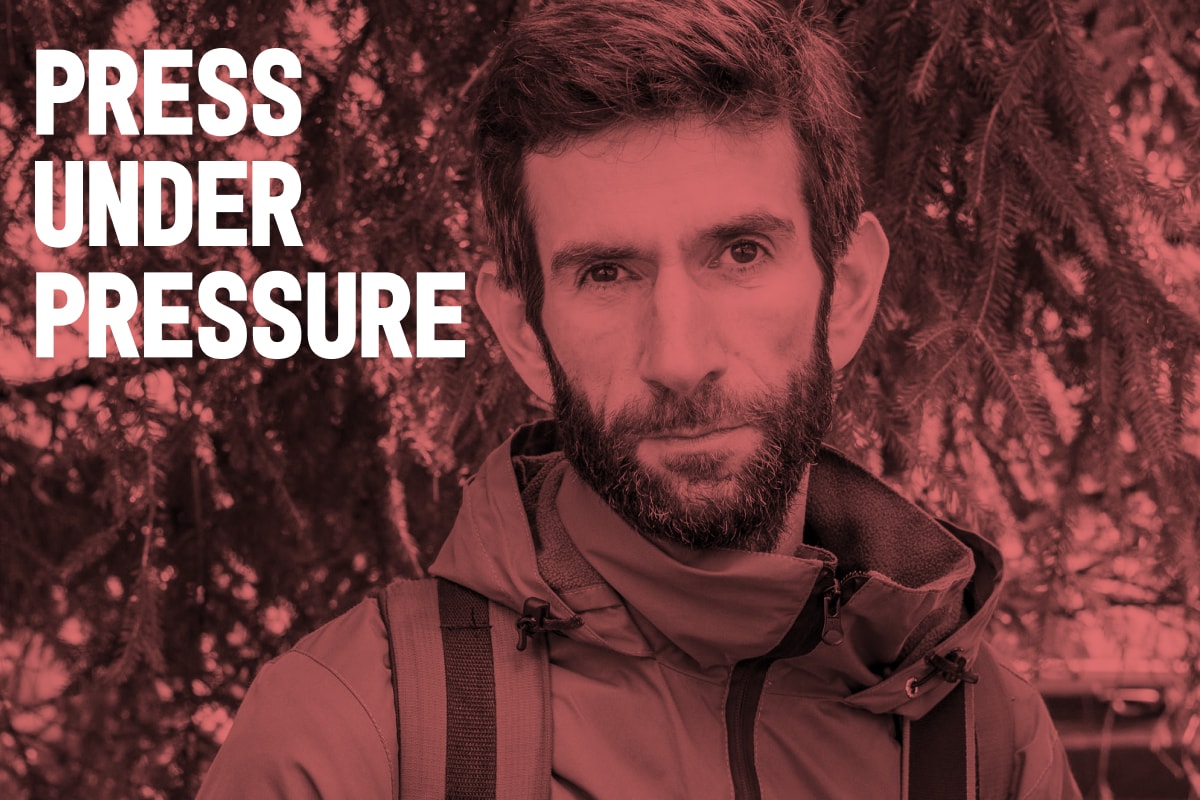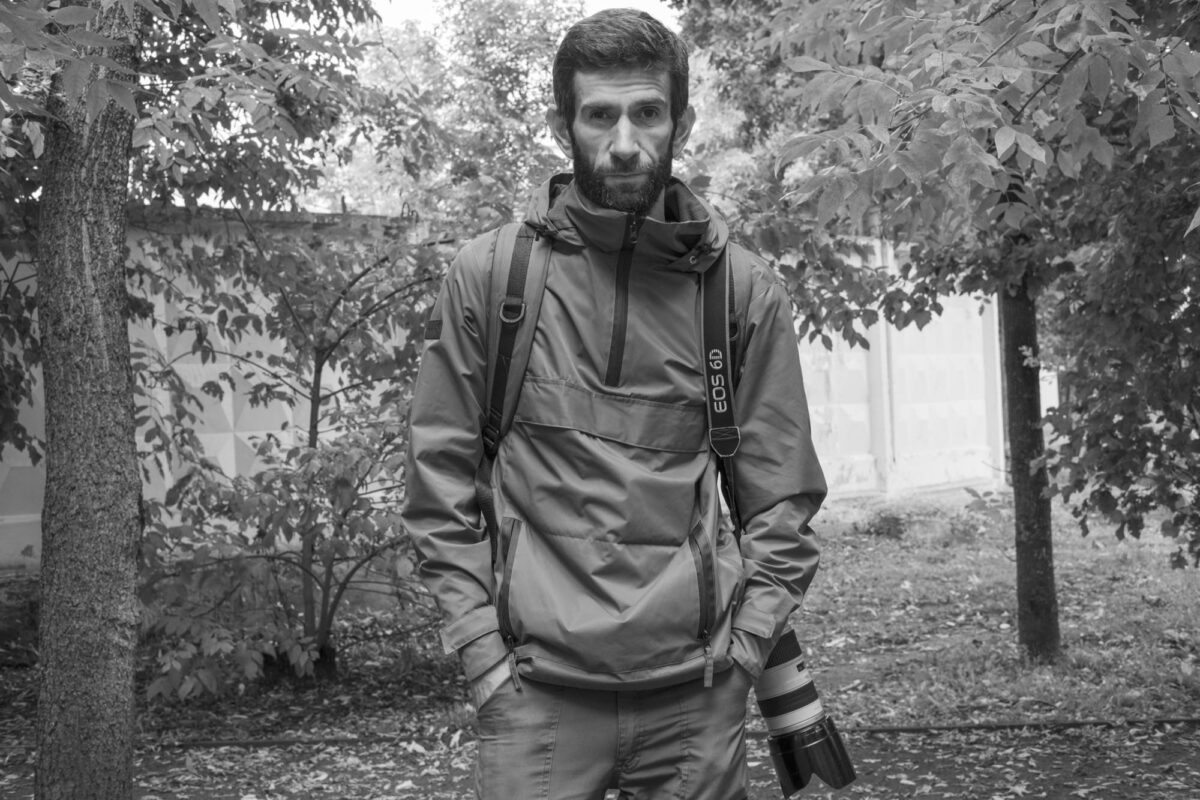
Vadim told us about the events of August 12, 2020, which he witnessed, as well as how on September 2, 2020 he was detained with the use of force at the national memorial to Alexander Taraikovsky, killed during the protests. The photojournalist was on an editorial assignment to shoot how people removed the road salt with which municipal service workers had covered over the inscription “We won’t forget» on the paving.
On September 2, I was on an editorial assignment to take pictures of people shoving away the road salt a utility crew had spread over the words “We won’t forget”, written on the pavement near the spontaneous memorial to Taraikovskiy. He had lost his life back in August.
Parents and their children were scooping the salt into trash bags with toy shovels. The view was very lovely. At a certain point I figured I had made enough shots and moved a safe distance away to send them back to base. Doing so is common practice among photographers, because you are not able to keep an eye on the situation around you and are unable to react in case something dangerous is going on while you are forwarding your pictures.
I retreated to the hill close to the Pushkinskaya subway station. But the place was not safe enough, it turned out. Suddenly I was hit from behind, thrown off my feet and dragged several meters across the ground. Thank God I managed to grip my camera as it slipped off my shoulder. Next, the policemen grabbed me and forced me into a white van. There was no one in it besides me. So you can say I had a VIP tour…
The policemen got very aggressive and started beating me in the van, punching me in the jaw a couple of times. By the way, my wife and I had joked about her having dental surgery, me encountering the riot police, and both of us being unable to chew for a while as a result.
While in the van, they made me unlock my phone and tablet. The policemen scrolled through my phone’s gallery and ranted about the large number of pictures it contained. That was logical, though, surely: I am a photographer. Then they ordered me to take all memory cards out of my pockets and cameras.
In just a couple of minutes, they calmed down and even asked me whether I wanted some water. “Why didn’t you tell us straight away that you work for TUT.BY?” they asked. But hey, it was written all over me that I was from the press, plus I had a badge.
In about 40 minutes, they put all my devices into my backpack, returned it to me and dropped me off somewhere on their way. However, they kept the memory cards. Unfortunately, it was not the first time when my memory cards were taken away from me. It had happened at Pushkinskaya before. It’s some kind of a memory card Bermuda Triangle…
The first thing I did was to check if the cameras were operational and if everything was in place. It was, but I had to get a lens and one of the cameras repaired. I believe it was clumsy mishandling rather than intentional damage.
I had no psychological trauma whatsoever. Regretfully, this is simply the reality you have to put up with if you are a journalist in Belarus. Well, they punch you a bit, no big deal… The main thing this time is that there were no boots or batons involved.
This detention story is certainly far beyond the scope of a normal journalistic routine. Sadly enough, it is quite typical and common in our work nowadays. The other story I have to tell, though, rings louder bells. In fact, it thunders.

Vadim Zamirovsky
I don’t remember exactly whether it happened on August 12 or 13. My colleague and I arrived at the site of a rally. The participants were not that many: about 300 people or so. My colleague had an attack of nerves, or perhaps her woman’s intuition had been activated, but she started insisting the place was unsafe. As it turned out, I have to admit she was right, and I am very grateful to her.
We started looking out for a spot where we could work at a distance without any interruptions and where they would not mistake us for protesters or start shooting at us. Finally, we found a single-storey building extension. Some people were already standing on top of it, the ones whose apartment windows overlooked the extension among them. It formed a terrace with a perfect view of the rally. We climbed there, and there were about 10 of us in total. The place was well-suited for taking photos.
I have to repeat there were only about 300 rally participants. Suddenly, seven or maybe even ten vans and prison trucks showed up, a disproportionally large number of them compared to the number of protesters. The enforcers began to disperse the rally in a ferocious, brutal way. They used stun grenades as well as those shotguns – pump actions ones, I think – I don’t know what exactly they are called, I am not an expert.
At some point a riot policeman shouted: “The roof! The roof!” We knew he meant us.
All those ten people standing on the extension roof burst into an apartment window within just a few seconds. I guess I had only fallen at such speed when diving to the bottom of trench on assignment to a warzone. We smashed into some random people’s apartment, closed the windows, turned the light off and whispered instead of talking aloud. The riot police were right at our windows. We could hear and see them well. They were shining their gunsight illuminators into the windows.
We discerned their tactics: they were blocking the whole district rather than just dispersing the rally. The traffic police sealed off roads and the riot police combed through the yard areas grabbing literally everyone, be it kissing couples or folks heading to the store. In about an hour – it was difficult to assess how much time had passed – the riot policemen entered the lobby, and we heard someone shrieking next to us. It turned out there were people hiding right behind the door of the apartment we were in. Of course, we were unaware of that. I am sure the owners would have let them in.
We watched everything happening down there by the prison trucks. We saw and heard people being beaten up. Those fished out in the yards and brought over were thrown to the ground near the prison trucks and brutalised with extreme ferocity. I mean, it was the cruelty much spoken about, the kind they demonstrated at Okrestina prison. Unfortunately, the distance was too far to take any shots, but we did witness it. Being sure they had no unwanted witnesses, the police acted with bestial ruthlessness.
The prison trucks left in three hours or so. We stepped into the lobby and saw splashes of blood that clearly belonged to the people who had been hiding there. It still hurts to recall and to speak about this.
Terms and conditions
Partial or full reprint is permitted subject to following terms of use.
An active direct hyperlink to the original publication is required. The link must be placed in the header of the reprinted material, in the lead or the first paragraph.
Reprints, whether in full or in part, must not make changes to the text, titles, or copyrighted photographs.
When reprinting materials from this page, attribution must be given to the Press Club Belarus “Press under Pressure” project, collecting evidence of repression against independent media and journalists in Belarus.